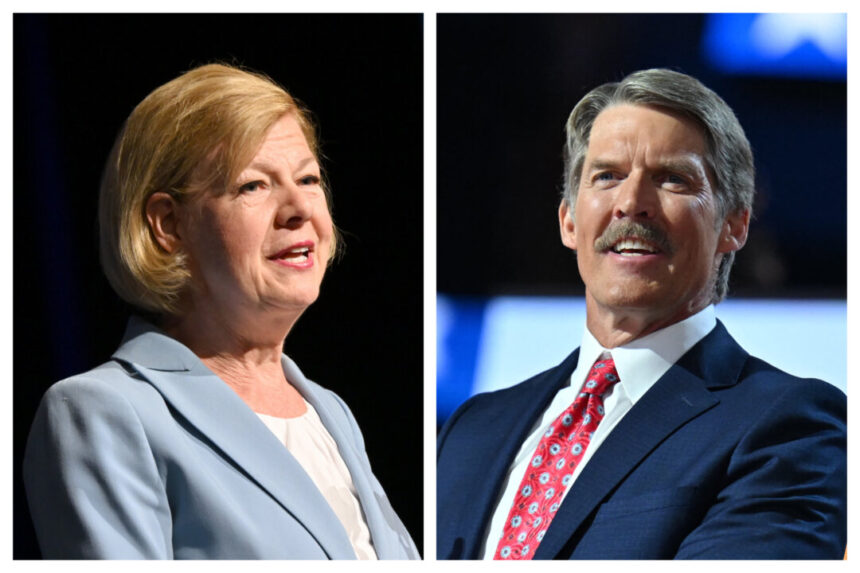Sen. Tammy Baldwin (D-Wis.) and Republican challenger Eric Hovde debated abortion, immigration, and foreign policy with 18 days to go before the election.
Democrat Wisconsin Sen. Tammy Baldwin and Republican challenger Eric Hovde squared off in an Oct. 18 debate less than three weeks before Election Day.
The one-hour exchange marked the first and only planned debate of the contest over Baldwin’s U.S. Senate seat, and both candidates traded barbs throughout.
During the debate, a panel of journalists from broadcasters across the state asked questions of the two candidates, while career broadcaster Jill Geisler moderated. Baldwin and Hovde typically had about a minute to respond to each question and Geisler closely enforced the time cut-offs.
Health Care and Social Security
The first question focused on the candidates’ views of the Affordable Care Act (ACA), commonly referred to as Obamacare.
Hovde said that the ACA hadn’t lived up to three key promises: to lower health care costs, increase access to health care, and allow families to stick with their preferred doctors.
“I’m a believer in results. If you look at the results, every one of those promises has failed. Costs of health care have only skyrocketed higher. Access to care has declined, and declined significantly, particularly for a lot of people in our rural communities. And lastly, the family doctor has all but disappeared,” Hovde said.
The Republican challenger said that as someone who has dealt with multiple sclerosis (MS), he did appreciate the ACA’s provisions on health care for people with preexisting conditions. Still, he said, “We need a significant restructuring of our health care system.”
Responding, Baldwin charged Hovde for attacking another ACA provision that allows young adults to stay on their parent’s health insurance policies.
“He also opposes efforts to negotiate with the big pharmaceutical companies to lower the price of prescription drugs, saving patients and Medicare money,” Baldwin said. “We need to build upon the Affordable Care Act, and we need to build upon our efforts to negotiate lower prescription drug prices.”
Hovde said his prescription costs for his MS medication are too high and that he supports the government negotiating prices with private pharmaceutical companies.
“I’m the one who’s against Big Pharma,” Hovde said, accusing Baldwin of taking “massive amounts of money from Big Pharma” for her reelection campaign.
Later, questions focused on the candidates’ positions on Social Security benefits and how to keep the federal retirement program’s solvency.
“Right now, multimillionaires like my opponent, Eric Hovde, pay minute amounts. They’re not doing their fair share. And if we lifted that income cap, the solvency would be extended for many years,” Baldwin said.
Hovde said he supports keeping Social Security benefits for current beneficiaries and said the solvency issues stem from runaway debt spending, noting the national debt has risen from about $5.5 trillion when Baldwin entered Congress in 1999 to nearly $36 trillion currently.
Abortion
As the debate continued, questions turned to the issue of abortion. The U.S. Supreme Court, in its 2022 decision in Dobbs v. Jackson Women’s Health Organization, concluded states should regulate abortion law, overturning the court’s 1973 decision in Roe v. Wade.
The candidates were asked whether the abortion standards articulated in Roe should be codified as federal law.
“I’m trying to lead the way to restore Roe so that we don’t see prosecution of women who have miscarried or doctors who are providing health care,” Baldwin said. “Women are dying because of the current situation.”
Hovde said the Dobbs ruling is an opportunity for the states to decide their own abortion restrictions and exceptions.
“I agree with exceptions for rape, incest, and the health of the mother, and I think women should have a right to decide early on in their pregnancy,” he said, accusing Baldwin of supporting late-term abortion.
Immigration
As the debate turned to the topic of immigration, questioner Aditi Debnath framed the discussion around whether the two candidates would revive a border and immigration reform proposal that failed in the U.S. Senate earlier this year. Debnath described the proposal as a bipartisan measure that would’ve “added tougher standards to qualify for asylum, allow for partial shutdowns at the border, and open new avenues for legal immigration.”
While some Republicans supported the Senate proposal, Hovde noted most congressional Republicans opposed the plan.
“That bill was dead on arrival. The House had already rejected it. It was masquerading as a border bill, while really funding Ukraine, and every senator once they found out what was in it was opposed to it,” he said.
The Republican candidate said the proposal would’ve codified into law the acceptance of around 5,000 daily illegal border crossings. Hovde criticized President Joe Biden’s administration for retracting key immigration and border control executive orders and presiding over millions of illegal border crossings annually.
“It would’ve added 1,500 new Border Patrol agents to our southern border and, had it passed in this spring, they would be there now,” she said. “Very importantly, the bill also deployed technology to our southern border to allow us to scan every vehicle that comes through our ports of entry. That would’ve allowed us to interdict fentanyl that is poisoning folks across this country.”
Foreign Wars
The debate eventually turned to foreign policy.
Questioner Jeff Thelen asked the candidates how the United States should balance support for Israel in its war with Hamas against concerns about harm to civilians in Gaza.
“Israel was attacked and they lost thousands of lives, and if our country was attacked we would go wage war on that country,” Hovde said.
“The Biden administration constantly meddling and trying to engage and tell them how to wage a war is wrong.”
The Republican candidate cast the current Israel–Hamas war as part of a broader fight with Iran. He faulted Baldwin, former President Barack Obama, and Biden for relaxing U.S. sanctions against Iran, which he said enabled Iran to fund terrorism.
Baldwin condemned the Oct. 7, 2023, Hamas attack on Israel that left around 1,200 people dead and set off the current Gaza war. Hamas took around 250 people back to Gaza as hostages, and around 100 still remain captive.
“Israel has the right to defend itself,” she said. “But as we’ve seen this war unfold, we’ve also seen untold civilian casualties, children, women. We have to help foster a path towards cease-fire so that the hostages can be released and so that humanitarian aid can be surged.”
The candidates were next asked whether the United States should continue its course of military and financial support for Ukraine after more than two and a half years of fighting with Russian forces in Ukraine’s eastern Donbas region.
“We have to stand on the side of democracy. [Russian President] Vladimir Putin is a dictator. He illegally invaded a sovereign democratic nation and the free world stood up to Ukraine’s defense,” Baldwin said.
She said the United States must stay the course to stop Putin from next attacking other countries in Europe, such as NATO-allied Poland; a war scenario she said “would mean U.S. boots on the ground.”
Baldwin eventually pivoted to attacking her opponent, stating it seems that former President Donald Trump—who has expressed his preference for ending the Ukraine war—“doesn’t know the difference between our allies and our enemies, and Eric Hovde stands with him.”
Hovde responded that he felt the current Russia–Ukraine war is a direct result of Biden’s handling of the U.S. withdrawal from Afghanistan in 2021.
“Do I think that Vladimir Putin is an absolutely evil man? Absolutely. But I think we need to try to find a way to get to peace,” he said. “Sadly, what’s happening in Ukraine is we’re wiping out generations of their people and turning a lot of their cities into rubble.”
Hovde said he was initially supportive of flowing weapons and aid to Ukraine, but he’s increasingly concerned about where that support is actually going.
“Tens of billions of dollars that have gone to Ukraine that are not accountable causes great concern for me. So I don’t think we should continue to fund endlessly money into Ukraine,” he said.










